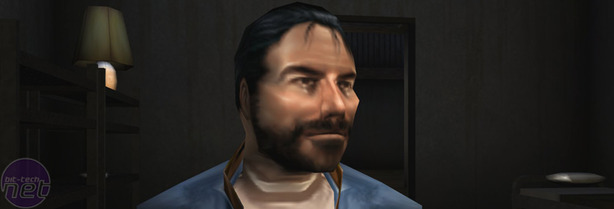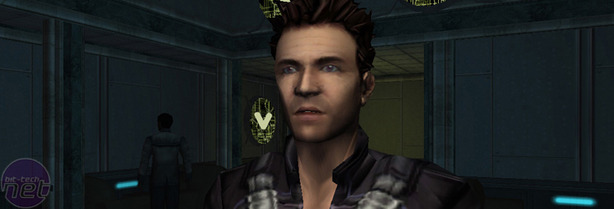Deus Ex vs. Invisible War
The problem with the original Deus Ex, apart from the awful voice acting and terrible graphics, is that despite the fact it’s set in the future it actually feels very old fashioned both in terms of the actual aesthetic style and in how the player experience is funnelled through the conspiracy.Yeah, that’s right – funnelled. The game that’s vaunted for the massive player agency it provides is actually a lot more controlled than you likely remember. From the moment the game starts with you cast as a cybernetic super-spy to the moment it finishes with the world’s fate in your hands and the neo-noir conspiracy unravelled it’s almost impossible to deviate from the path.
Despite being held up as one of the most freeform games ever developed, the original Deus Ex is actually exactly as linear as a Choose Your Own Adventure book. You can make moment-to-moment decisions about whether or not to kill someone, but you’re still fed through same levels in the same order no matter what and it’s only at the last minute that you’re actually put in control…of which outro cutscene to show.
That linearity isn’t properly tackled in Deus Ex 2 unfortunately and Invisible War shares a remarkably similar structure for a game which is so often decried as being too different – but at least it expands the feeling of personal interaction which was so lacking in the first game.
Despite how Deus Ex is remembered, JC Denton’s world is one of astonishing consistency and it’s actually very rare for you to be able to influence a character’s opinion of you. You can make life-or-death decisions, about whether Paul or Tiffany Savage die for example, but it doesn’t actually change all that much and the reactions of those around you will be mostly the same – you can actually blow Tiffany up yourself and her father will still thank you for trying your best.
In fact pretty much the only relationship you can properly have any effect on in Deus Ex is one which is completely inessential to the plot – the fates of the Renton family. Owners of a NYC hotel, your early interactions with them can change how they talk to you and what they say. Take care of the drug dealers making Sandra’s life a misery and you might be able to keep their family unit together, while shattering it will have her showing up as a melancholic runaway in a much later level. It’s the only instance in Deus Ex where you’re likely to act out of concern for what NPCs might think of you.
In Invisible War though this idea of giving players an actual emotional motive, rather than a tactical one, is carried to a proper conclusion. If you like games which provide an emotional attachment then DX2 is a clearly superior game.
It’s simply accomplished. At the start of the game you’re introduced to your classmates at the secretive Tarsus Academy, which functions as the tutorial for the game proper. Soon enough the school is destroyed and you’re loosed on the conspiracy-filled world. You’re alone, but you’re not the only one who got out and your classmates each make periodic reappearances throughout the remainder of the game and you’re given a chance to pass judgment on them or scald them for making wrong choices. You can run errands to help them out and in the final levels you can make direct choices about which friends are worth saving and which aren’t.
What makes this brilliant is the fact that Invisible War’s economy of resources is almost totally broken. It’s almost impossible to go five steps without tripping over money, while every weapon in the game uses the same Universal Ammo. That means rather than saving your one-time classmate Klara from her position as an Illuminati hostage because it might get you some money or weaponry, you’re doing it almost purely because of an attachment to that character or some over-riding philosophy.
And that’s what makes Invisible War better than the original Deus Ex; the first game gave you plenty of places where you could decide the fates of characters, but the motive was rarely anything even close to emotional. It didn’t matter if you liked Chinese hacker Tracer Tong or not – you were still going to go to his lab and then do missions for him no matter how you felt. Deus Ex operated on the ethic of necessity, Invisible War on the simplicity of preference.
Invisible War improved on the original’s formula in other ways too – dropping rare unique weapons in to the world to provide an incentive for those who actually preferred the tactical reward that comes from completing a mission. It also improved the graphics to a point that made the game actually desirable and accessible – a shallow complaint, but one which counters every time I’d had to insist that someone play the original Deus Ex past the first level in order to overcome the 16-bit textures and blocky modelling.
In the end though it’s the emotional connection formed with the characters which proves that Invisible War was a superior game to Deus Ex, even if interpreted at it’s most basic level. Take IW’s Leo Jankowski as an example; blond, cocky and built like Superman’s big brother, Leo begins working for the cybernetic Omar traders early in the game and his jock-like smarm is a constant annoyance. It’s impossible not to bristle at his charisma or to prevent the swell of smugness when he finally begs for your help. His is by far the shallowest character in Invisible War, but compared to Deus Ex’s cast of indifferent schemers and monotoned wrongdoers he’s of unplumbed depth.
Again though, most Deus Ex fans will disagree with this idea with such vehemence that it’s occasionally scary – again revealing how the topic has been emotionalised and how the correct opinion (that Deus Ex is a better game) all too often gets in the way of the fair opinion (that IW is still a good game).

MSI MPG Velox 100R Chassis Review
October 14 2021 | 15:04












Want to comment? Please log in.